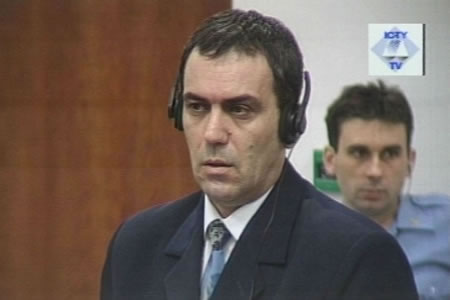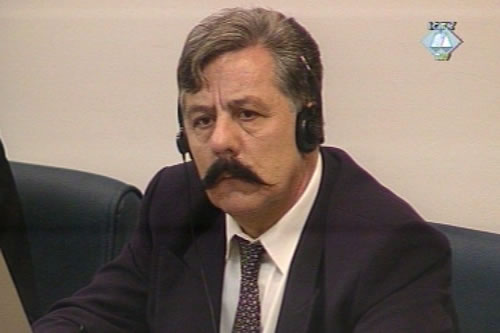Home
IT IS NOT IN THE INDICTMENT, BUT IT IS IN THE JUDGMENT
A duel between the prosecutors and the defense for Miroslav Kvocka, Dragoljub Prcac, Mladjo Radic and Zoran Zigic before the Appeals Chamber of the Tribunal: the defense points out that although the indictment did not charge them with participation in a "joint criminal enterprise", all four have been found guilty of that in the judgment.
 Zoran Zigic in the courtroom
Zoran Zigic in the courtroom All four defense counsel of the four men convicted of crimes in the “Omarska case” listed the "inconsistency of the indictment and the judgment" as one of the grounds for the appeal. Krstan Simic, defense counsel for Miroslav Kvocka termed it "lack of identity between the indictment and the judgment". Although the accused were not charged with participation in a "joint criminal enterprise", they were all, as their defense counsel point out, found guilty of it. Furthermore, the defense counsel all stated that the sentences imposed on their clients were inappropriate in light of the length of time the convicted persons had spent serving in the camps. They also indicated that their status had not been established definitely at the trial, yet the sentences were based on their superior position.
In the case of Kvocka, who spent 17 days serving in the Omarska camp, i.e., 12 guard shifts as calculated by the defense, the indictment first stated that he was the commander, then deputy commander and then, as his lawyer Simic pointed out, it turned out that there was no camp commander in Omarska and that therefore there could not have been a deputy commander.
Dragoljub Prcac's counsel presented a similar argument; his client, according to him, did only 11 shifts in Omarska. Challenging the definition in the judgment, defense counsel Jovan Simic said that his client was not "an administrative assistant to an imaginary camp commander" but a technician who did maintenance of radio equipment. As for Mladjo Radic, his defense counsel Toma Fila claims that it was never established that he was a guard shift leader; he was just an ordinary guard. Zoran Zigic did not hold any position of authority in the camps in Prijedor. His defense counsel claims that he visited Omarska only once, for half an hour, yet the judgment finds him guilty of participation in a joint criminal enterprise, of murders, torture and inhumane acts committed both before and after what was allegedly his half-hour stay in the camp.
The defense counsel for the appellants took exception to the fact that the prosecution did not appeal the judgment. Fila and Slobodan Stojanovic (Zigic's counsel) claim that the prosecution did not appeal precisely because of the "inconsistency between the indictment and the judgment". They say that "nothing was left of the indictment" after the trial and that they had nothing to appeal against. The Trial Chamber, the two defense counsel claim, "tried to salvage the charges" and showed their bias in doing so, by accepting only those parts of witness testimony that went in favor of the prosecution and against the defense.
Claiming that this constituted a breach of the Rules of Procedure and Evidence, the defense counsel sought that the verdicts be quashed or that the sentences imposed on the four accused be commuted.
In their response to the arguments presented by the appellants, prosecutors Norul Rashid and David Ra confirmed that "joint criminal enterprise" was not mentioned in the indictment, but pointed that the key elements of this type of criminal liability were contained in the majority of the counts. According to them, all the accused are participants in a joint criminal enterprise because they were all able to ascertain from the very first day that the camps had been established for the purpose of the implementation of the enterprise: the persecution of the non-Serb population of Prijedor.
Despite the fact that they saw the dead bodies of the detainees in the camp compound and witnessed the beatings, maltreatment, cruel treatment and inhumane conditions of detention, the accused continued to carry out their tasks and contributed to the maintenance and "impeccable functioning of the camp". Regardless of whether they held an official function or not, it is the submission of the prosecution, they had effective power over the detainees and they therefore consciously took part in the persecutions.
Mladjo Radic remained in service from the beginning of the existence of the camp until it was closed down. As for Kvocka and Prcac, the brevity of their engagement in the camp does not reduce their responsibility, according to the prosecution. "It is not the length of the period that matters," said Ra, "it is the depth of the involvement." They voluntarily took their part in keeping the camp operational and by doing so they made an objective contribution to the implementation of the joint criminal enterprise. When he came to the camps in Omarska and Keraterm, Zigic was a direct perpetrator. By engaging in torture, cruel treatment and murders, he contributed, in the words of prosecutor Rashid, to the "core of the joint intent, which was the plan to persecute non-Serbs."
In response to the objection raised about their failure to appeal, the prosecutors said that in their view the Trial Chamber had imposed adequate sentences. They argued in favor of the sentences remaining the same, i.e., that the sentences of seven years for Miroslav Kvocka, five years for Prcac, twenty years for Radic and 25 years for Zigic should stand.
Photos

